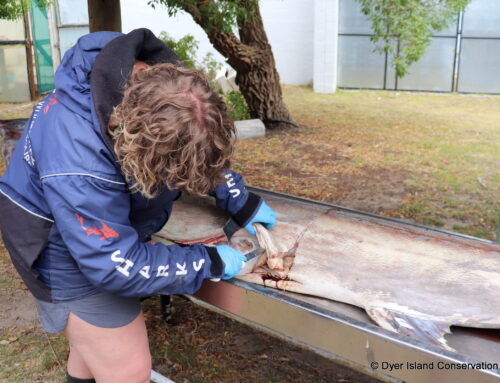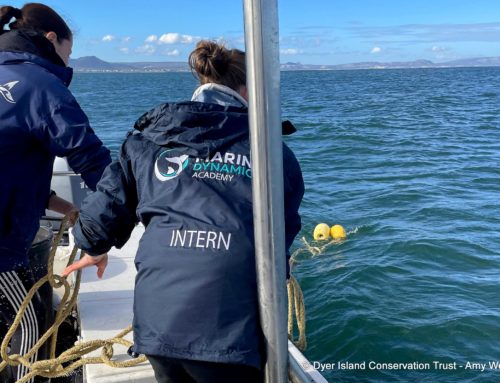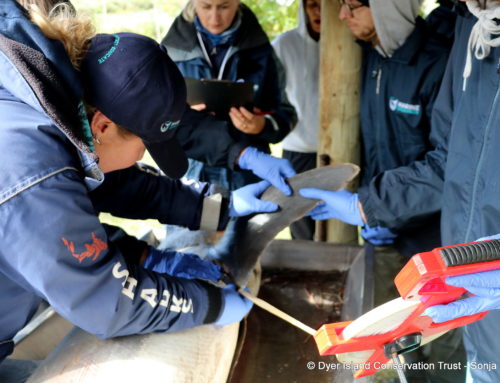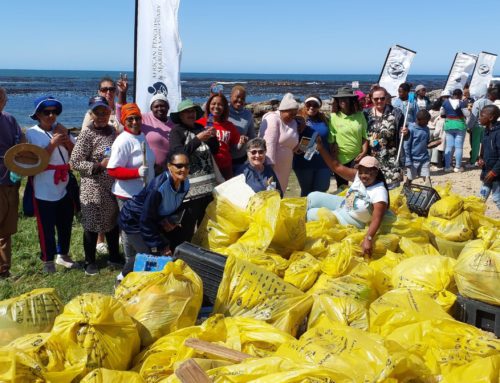BEACHED DECEASED WHALE AT ROMANS BAY
WHALE FESTIVAL 24-27 SEPTEMBER
September 23, 2009 by dyertrust
DICTwill be at the Whale Festival 24-27 September in Hermanus, at the Enviro Expo marquee on the lawn in front of the Village Square Waterfront Piazza.
Fascinating talks on the Marine Big 5 will be held on the Saturday and Sunday
Toreadmore& see the scheduled programme go to .
.
Gansbaai,Western Cape,South Africa
15th-18thApril 2009
The 2ndInternational African Penguin Conference, organized by the Dyer Island Conservation Trust, took place from the15-18thApril 2009inGansbaai,Western Cape,South Africa.The conference brought together 80 delegates, both local and international, including conservation managers, research scientists, conservationists and seabird rehabilitation experts. Participating organizations included: Cape Nature, South African National Parks,OverstrandMunicipality,RobbenIslandMuseum,UniversityofCape Town, Marine and Coastal Management (Department of Environmental Affairs and Tourism), University of Bristol (UK), SANCCOB, BirdLife SouthAfrica, Penguins Eastern Cape, SAMREC, Two Oceans Aquarium, Bayworld, the US SPP Program, and the Dyer Island Conservation Trust.The conference focused on the continued decline of the African penguin population and aimed to consolidate the links and strategies needed to address this dramatic decline.
This report provides a brief summary of some of the highlights of the Conference.Scientific proceedings, sponsored by the World Wildlife Fund, will be published later this year.To register for a


(Kemperet al2007).
Professor Crawford informed the conference: The number of African Penguins continues to decrease at an alarming rate.In 2008 just 28,000 pairs were recorded breeding and it is likely that food scarcity is adversely influencing both recruitment (chicks that survive to become breeding adults) and survival.
Anchovies and sardines are the main part of the penguins diet and studies inNamibiaand theCapeshow that the reduction or movement of these shoals coincide with falls in the numbers of breeding penguins.These fish have moved eastward (possibly due to changes in sea temperatures).As a result, the breeding colonies of African Penguins onRobbenIslandandDassenIslandhave declined and the lifespan of breeding adults has decreased.
Professor Crawford said more research into this relationship between fish stocks and penguin survival is needed urgently.This would allow scientists to advise on the size of allowable catches and the exclusion zones of purse seine fishing near to breeding colonies.


(Fairweatheret al2006)
The survival of adult penguins is also causing concern according to speakers at the conference.William Robinson of theUniversityofCape Townshowed that adult survival on Robben andDassenIslandshas fallen by more than 40% since 2000.
African Penguin on edge of being endangered species
Professor Crawford andProfessorLesUnderhill(of the University of Cape Town), said that the African Penguin could become classified as an Endangered species in the coming years if the current population decline remains unchecked.They said that up to 2006 the annual decrease was about 1.4%.In the last two years the decline has become more rapid as is now about 2.4%.
ProfessorUnderhillsaid: This translates to 21.1% decrease per 10 year generation since 1978 and a 50.9% decrease over three generations.As a result, this is pushing the African Penguin into the Endangered category.Currently, the InternationalUnionfor Conservation of Nature (IUCN) classify the African Penguin as a “Vulnerable species, i.e. a population that is judged to be declining between 20-50%.
How can the decline be halted?
Delegates to the conference called for increased funding for research to reverse the decline in numbers of African Penguins before they reach the tipping point where it becomes impossible to save a viable population.
Work being conducted on the island colonies of Dassen, Robben, Dyer, Bird and St Croix all points to the need to understand the relationship between survival and the availability of food, notably sardines and anchovies.The Dyer Island Conservation Trust is actively supporting this work as well as rescue programmes for abandoned chicks and oiled birds.
Predation of eggs and chicks, by gulls and other birds, remains a major issue.The Trusts innovative scheme of providing artificial nests was discussed during the conference.
These data show that:
- Nest occupancy is high with at least half of the nests being occupied at any given time in the breeding season
- More than two-thirds of adults occupying the nests fledged at least one chick onRobbenIsland
- More chicks survived in an artificial nest than in open nests in theMandelaBaycolonies in theEastern Cape
To date, more than1350 nests have been installed in6 breeding colonies along the Western and EasternCapeCoast.The Trusts goal is to raise funds for a further 1500 nests in 2009. To sponsor a nest simply

The keynote speaker at the conference Professor Peter Barham, Professor of Physics at the University of Bristol, UK is an internationally recognised authority on the penguin species of the world and a tireless campaigner for their protection
African penguins are geographically isolated from all other penguin speciesno other penguins occur inAfrica.Nearly all other species occur in regions where they will, from to time, encounter other types of penguinthe only exception being the Galapagos penguin which is unlikely to encounter its nearest penguin neighbours, the Humboldt penguins, at all often.African penguins are similar in appearance to the other Spheniscus penguins (Humboldt, Magellanic and Galapagos), but differ in behaviourfor example the most similar penguin (in appearance) is probably the Magellanic penguin, but these are highly migratory birds only attending the colonies during the breeding season.African penguins by contrast have no rigidly fixed breeding season (although there are of course peaks and troughs in the breeding through the year) and are present in the colonies throughout the year.
My particular interest in African penguins began when I came, as an interested observer, to the 1996 International Penguin Conference inCape Townand saw African Penguins (andAfrica) for the first time.During that meeting I was challenged by other delegates to develop improved flipper bandsthe resulting silicone rubber bands were subsequently tested as part of our Earthwatch project with African penguins onRobbenIslandand are just now starting to be used in earnest.Having been fortunate enough to be able to work with African penguins for the last decade, I have come to love them (despite the many bites and scratches they tend to impart) and want to do all that I can to help preserve the species.
Steep decline in numbers causes much concern
In common with all those who have been working with African penguins in the last few years, I have noticed the steep decline in numbers with much concern and even some alarm.We need to understand the underlying causes; of course, food supply must be a major factor.But we do not know for sure whether this is caused by overfishing,by fish stocks moving with changing ocean currents due to effects of global warming, or even whether the penguins are less able to find fish than previously (they may be weaker due to, for example, build up of pollutants over the years).Other issues affecting penguins include increased predation by fur seals around some colonies, the continuing risk of oil spills, and as the climate warms up the lack of suitable, cool, places to breed within the traditional colonies.


We can address some of these issues head on.We can provide suitable nesting sites (the Dyer Island Conservation Trust nest boxes are a prime example of how this can be done); we already do request that rogue seals found taking large numbers of penguins are culled; and we can argue for reductions in the fishing quotas around the main colonies.But we also need to continue research to understand better the underlying causes of the decline. If we are to be able to correlate penguin population decline with, for example, the amount of fish taken by the purse seine fisheries around the main colonies; we need accurately to establish the population numbers and how they are changing; to have reliable estimates of annual breeding success at all the colonies as well as good data on where the penguins are foraging and how long they spend at sea to find the food they need to feed themselves and their chicks.It is only with such reliable data that we are likely to be able to persuade the fishermen to change their behaviour.
Worldwide co-operation required
However, this may not be enough, if we find that the problems arise from movement of fish, rather then reduction in the number of fish, we need to learn how we can persuade penguins to form new colonies closer to the fish stocks.Again this requires some basic research so that we can understand what factors influence young birds to form new colonies rather than simply returning to their natal colony.This is something we are starting to do in the chick bolstering project with the hand reared orphaned chicks taken each year fromDyerIsland.
I do believe that if we continue with all the current efforts there is a good chance that we can understand well enough what the problems are before they become insurmountable that we will be able to take appropriate actions to prevent the species becoming extinct.
However, this will require a lot of cooperation with a large number of people and organisations all working together.For example, zoos in the Northern hemisphere probably hold more African penguins than breed on Dyer Islandthese birds all breed well, so eggs could be taken from them and the chicks hatched and raised in South Africa to bolster the population in places where it is most needed. International Conservation Organisations have roles to play in lobbying Governments to try to persuade them to act to reduce fishing in sensitive sea bird areas.Finding funding to carry out the necessary work is not easy, so international bodies need to be approached and persuaded of the need to contribute.
It is particularly difficult to get so many organisations and individuals all working together and all agreeing on the right way forward; especially when not all share the same priorities and views on all the issues.Hopefully meetings like the recent International African Penguin Conference organised by DICT will help keep us together.For if we cannot all work together in a constructive fashion towards agreed common goals, it is the African penguin that will sufferwithout our help, I would not be surprised to see the species go extinct in the wild before the end of this century.For me failure is therefore not an acceptable option.
2009 Dyer Island Conservation Trust
.jpg)




.jpg)


.jpg)








